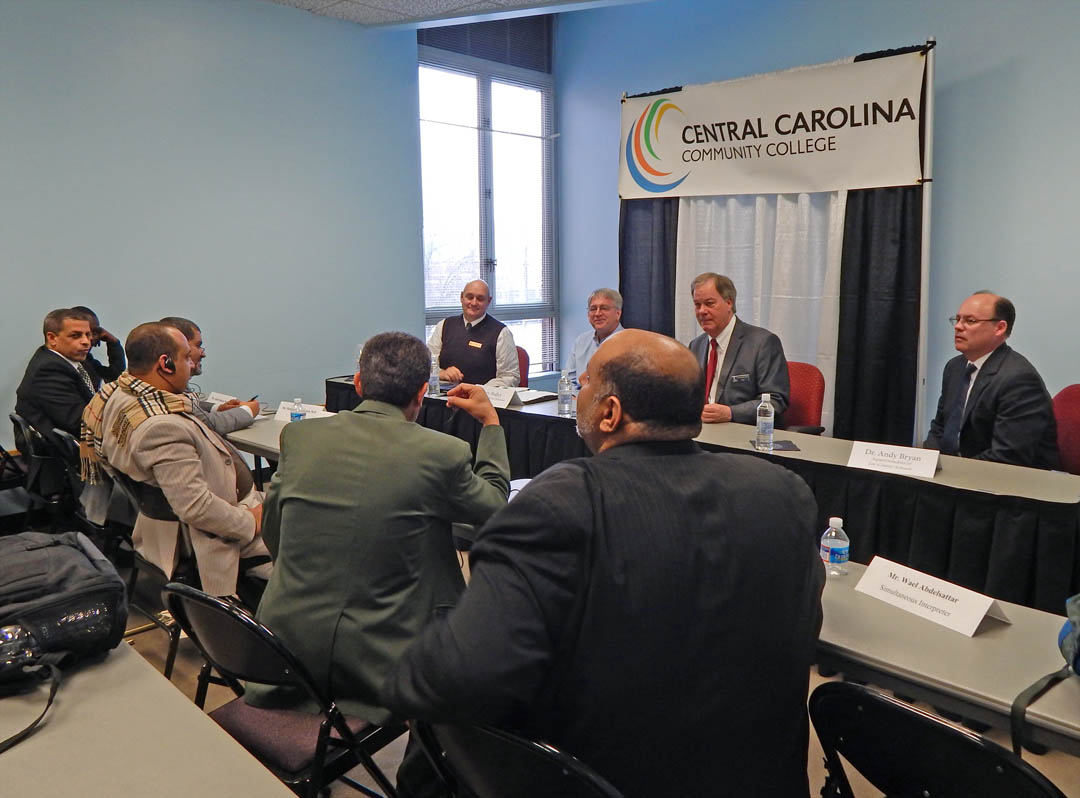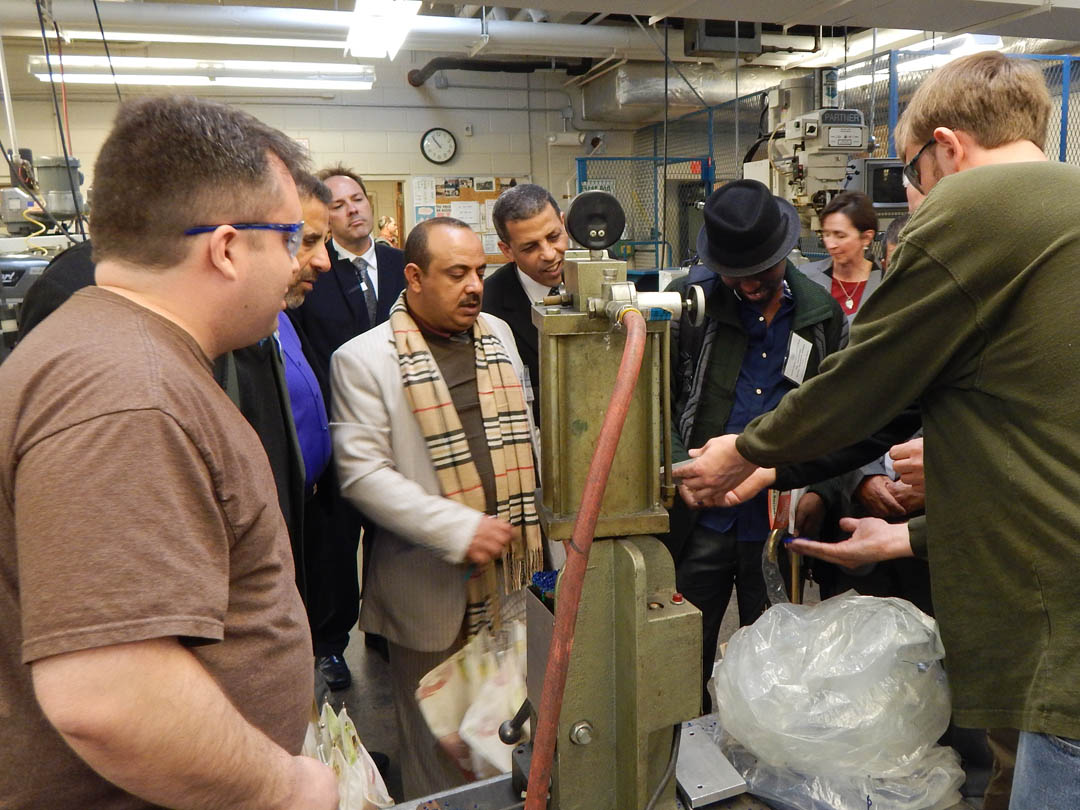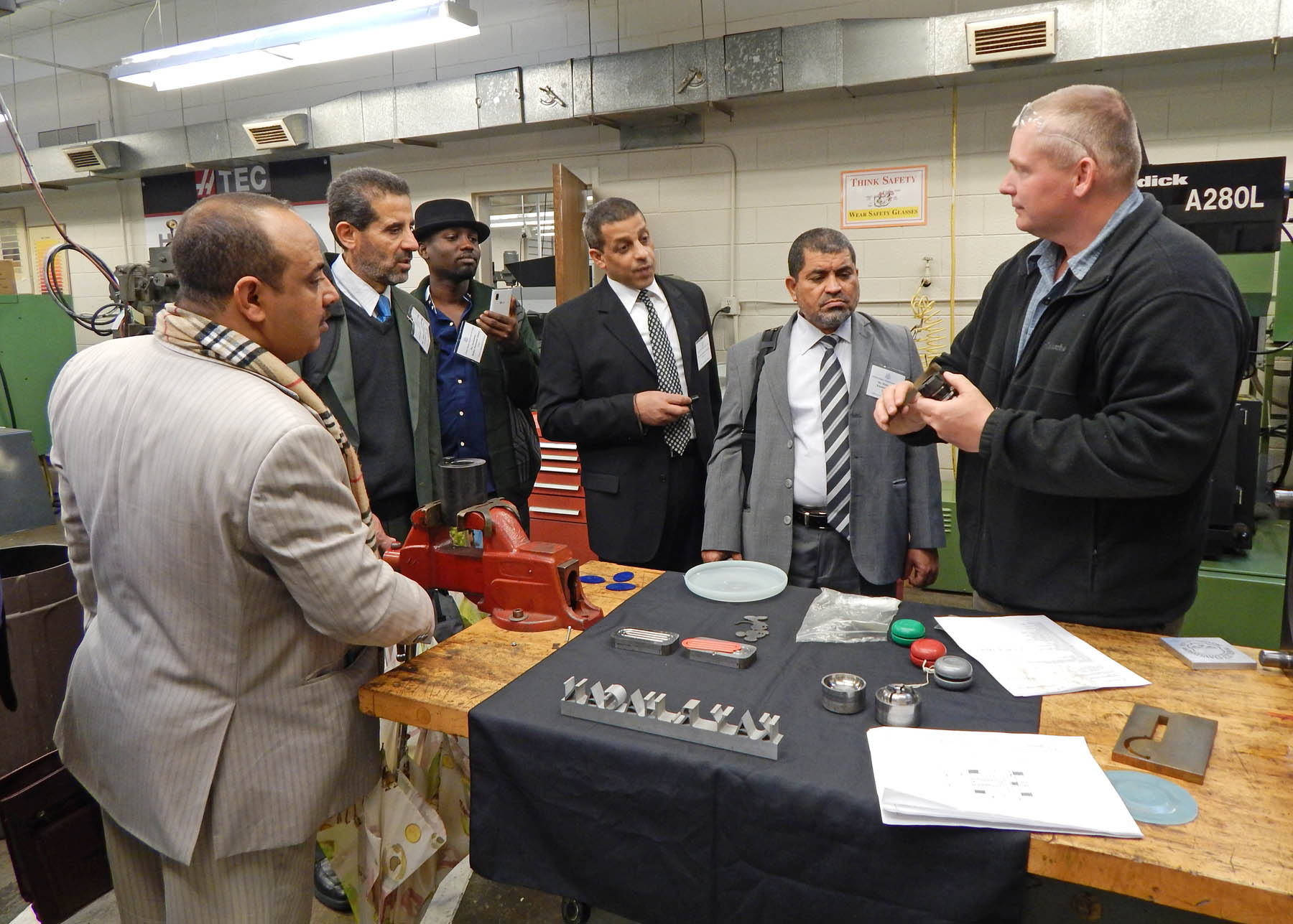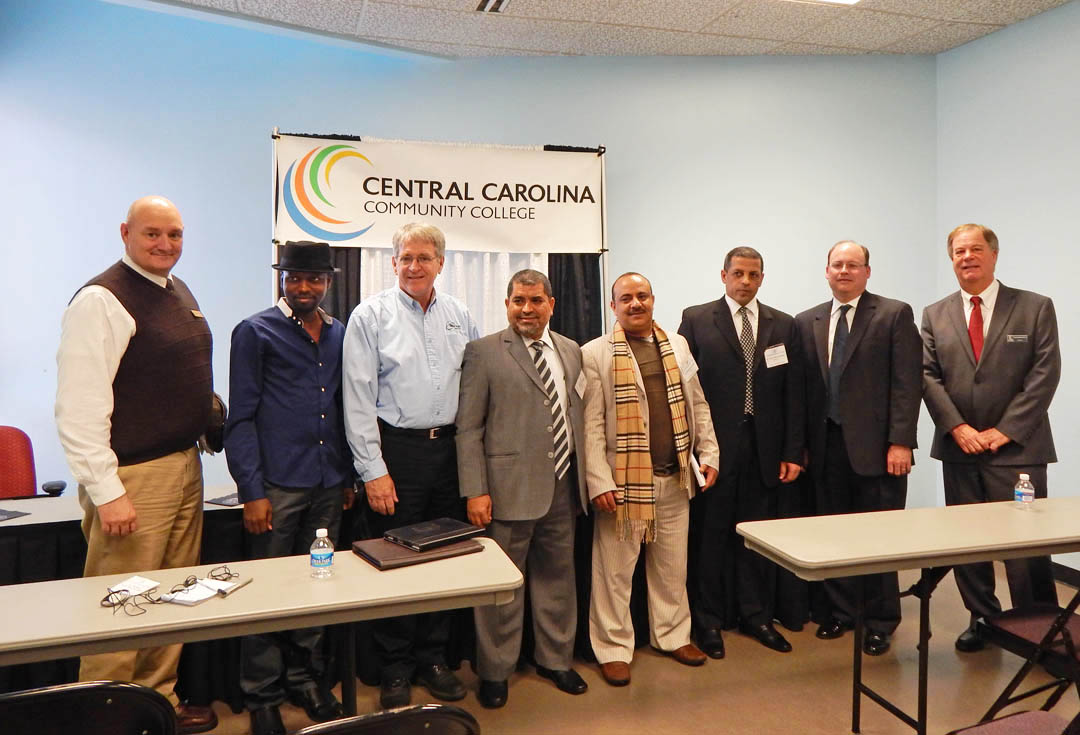
College News
CCCC training, partnerships impress international visitors
03.11.2014 • College & Community, College General, Special Events
SANFORD - Many thousand miles separate Africa and the Middle East from Central Carolina Community College, but several educational leaders from that area visited the college's Lee County Campus March 3.
They came from the nations of Morocco, Chad and Yemen to see first-hand how American community colleges help to educate the workforce through hands-on training and community partnerships.
The leaders visited the college's Industrial Systems Technology and Computer Integrated Machining programs. They then had a question-and-answer session with a panel composed of CCCC President Bud Marchant, Lee County Schools Superintendent Andy Bryan, Mertek Solutions President Jerry Pedley, and CCCC Dean of Vocational, Technical and Public Services Stephen Athans.
The delegation members were: Dr. Mohammed Khanbash, rector of Hadhramout University, Yemen; Professor Mankhous Bechir Mahamat Ahmat, Computer Science, King Faisal University, Chad; Professor Abderrahman Nounah, Head of the Urban and Environmental Engineering Department, Ecole Superieure de Technologie, Morocco; and Communication Unit Manager Mugahed Al Samawi, Ministry of Education, Yemen. Translators Wael Abdelsattar and Mohammad Abulimon accompanied the leaders.
The visitors expressed interest in the extensive hands-on training the college provides for students. They observed machining students Jess Rhodes, of Carthage, and Eric Honeycutt, of Lillington, operating a plastic molding machine to create keychain tags that the students had designed.
Chris Jackson, Machining/Tool and Die instructor, pointed out that the principles and workforce skills used to create small items through plastic molding or metal stamping in the hands-on college shops are the same as those used to operate the large equipment in industries.
"I learned a lot," Ahmat said. "In Chad, you see lectures and some practice, but not so much practice as here. I really like that the students do more."
At the panel session, the visitors were able to ask questions and gain ideas to take back to their institutions and countries about improving vocational training and how partnerships benefit education.
They learned about the options that community colleges offer, whether training people for well-paying jobs that do not require a university education or providing the first two years of non-specialized courses for students who can then transfer to a four-year institution.
"Central Carolina Community College takes 'community' very seriously," said Marchant. "We work with the people who will employ our students. We work with our public school partners to make sure the students come in with the skill levels they need."
The visitors learned that local economic development is dependent to a great extent on the partnerships between educational institutions, particularly community colleges, and the businesses and industries that hire their graduates.
"All companies need trained workers," said Pedley, who has served on several college vocational program advisory committees for years. "We don't know what skills our workers will need next year, but CCCC is flexible and responds very well to our changing workforce needs."
Bryant noted that the college and Lee County Schools partner with Caterpilllar, Inc. to train students with welding skills, benefiting the student, industry, and the community. The college and school system also partner to have Lee Early College on the college's Lee County Campus. There, students can earn a high school diploma and two-year degree within five years.
Currently, CCCC, Lee County Schools, and Chatham, Harnett and Lee counties, are collaborating to launch Central Carolina Works, Bryant said. This will put career counselors in every public high school in the three counties to assist students in planning their education to achieve their educational goals, whether it is a vocational degree or going on to a four-year institution.
The visitors said that education is free in most of the Arab world, but there are few community colleges and prospective students must go through a selection process to be able to attend. That contrasts with North Carolina, which has 58 community colleges, all within driving distance of students, which are open to all.
The delegation wanted to know how CCCC attracts students. Athans said community colleges offer three distinct advantages: excellent courses taught by instructors who want to teach, rather than do research; affordability compared to four-year institutions; and an environment that allows the students to mature socially in a supportive setting before going to a university, if that is their goal.
"I absolutely learned a lot from this visit," Khanbash said following the visit. "I learned about the idea of partnerships between the college and others. I am going to discuss this when I get back home."
The visit to Central Carolina Community College was arranged through the International Focus, Inc., in Raleigh, in cooperation with the U.S. Department of State's International Visitor Leadership Program and the Institute of International Education. It is part of the USDS' "Workforce Development and Alternatives in Higher Education" project for the Near East and North Africa. The visitors stopped first in Washington, D.C., and then visited Northern Virginia Community College, before coming to CCCC.
For more information about what Central Carolina Community College offers, visit www.cccc.edu.

Education leaders from the nations of Morocco, Chad and Yemen sit down for a question-and-answer session with Central Carolina Community College, Lee County Schools, and industry leaders about how an American community college helps to educate the workforce through hands-on training and community partnerships. Pictured (front, from left) are Mankhous Ahmat, computer science professor, King Faisal University, Chad; Abderrahman Nounah, professor and head of the Urban and Environmental Engineering Department, Ecole Superieure de Technologie, Morocco; Dr. Mohammed Khanbash (behind Honeycutt), rector of Hadhramout University, Yemen; Mugahed Al Samawi, Communication Unit Manager for the Yemen Ministry of Education; and translators Mohammed Abulimon and Wael Abdelsattar. The CCCC panel (back from left) is composed of Dr. Stephen Athans, CCCC Dean of Vocational, Technical and Public Services; Jerry Pedley, founder and president of Mertek Solutions, in Sanford; Dr. Bud Marchant, CCCC President; and Dr. Andy Bryan, Lee County Schools Superintendent. The March 3 visit also included a tour of the college's Industrial Systems Technology and Computer Integrated Machining programs The visit was arranged through the International Focus, Inc., in Raleigh, in cooperation with the U.S. Department of State's International Visitor Leadership Program and the Institute of International Education. For more about Central Carolina Community College's programs, visit www.cccc.edu.

Central Carolina Community College Computer Integrated Machining students Jess Rhodes (left), of Carthage and Eric Honeycutt, of Lillington, show visitors from Africa and the Middle East a keychain made using the plastic stamper, one of the pieces of equipment they learn to operate. Pictured from left are translators Wael Abdelsattar and Mohammed Abulimon (behind Rhodes); Mike Messersmith, CCCC director of Human Resources; Mugahed Al Samawi, Communication Unit Manager for the Yemen Ministry of Education; Abderrahman Nounah, professor and head of the Urban and Environmental Engineering Department, Ecole Superieure de Technologie, Morocco; are Mankhous Ahmat, computer science professor, King Faisal University, Chad; Celia Hurley, CCCC vice president for Institutional Advancement, and Dr. Mohammed Khanbash (behind Honeycutt), rector of Hadhramout University, Yemen. The visit was arranged through the International Focus, Inc., in Raleigh, in cooperation with the U.S. Department of State's International Visitor Leadership Program and the Institute of International Education. For more about Central Carolina Community College's programs, visit www.cccc.edu.

Chris Jackson (right), Central Carolina Community College Computer Integrated Machining instructor, speaks with an International Leadership delegation from Africa and the Middle East about the creation of tools and other objects by students in the college's CIM program and its partnerships with area industries. Pictured (from left) are Mugahed Al Samawi, Communication Unit Manager for the Yemen Ministry of Education; translator Mohammed Abulimon; Mankhous Ahmat, computer science professor, King Faisal University, Chad; Abderrahman Nounah, professor and head of the Urban and Environmental Engineering Department, Ecole Superieure de Technologie, Morocco; and Dr. Mohammed Khanbash, rector of Hadhramout University, Yemen. The visit was arranged through the International Focus, Inc., in Raleigh, in cooperation with the U.S. Department of State's International Visitor Leadership Program and the Institute of International Education. For more about Central Carolina Community College's programs, visit www.cccc.edu.

Education leaders from the nations of Morocco, Chad and Yemen visited Central Carolina Community College March 3 to learn how an American community college helps to educate the workforce through hands-on training and community partnerships. They toured the college's Industrial Systems Technology and Computer Integrated Machining programs and had a question-and-answer session with a panel from CCCC, Lee County Schools and local industry. Pictured (from left) are Dr. Stephen Athans, CCCC Dean of Vocational, Technical and Public Services; Mankhous Ahmat, computer science professor, King Faisal University, Chad; Jerry Pedley, founder and president of Mertek Solutions, in Sanford; Dr. Mohammed Khanbash, rector of Hadhramout University, Yemen; Mugahed Al Samawi, Communication Unit Manager for the Yemen Ministry of Education; Abderrahman Nounah, professor and head of the Urban and Environmental Engineering Department, Ecole Superieure de Technologie, Morocco; Dr. Andy Bryan, superintendent of Lee County Schools, and Dr. Bud Marchant, president of CCCC. The visit was arranged through the International Focus, Inc., in Raleigh, in cooperation with the U.S. Department of State's International Visitor Leadership Program and the Institute of International Education. For more about Central Carolina Community College's programs, visit www.cccc.edu.
- Central Carolina Community College
- Serving Chatham, Harnett, & Lee Counties, NC
- 1-800-682-8353




